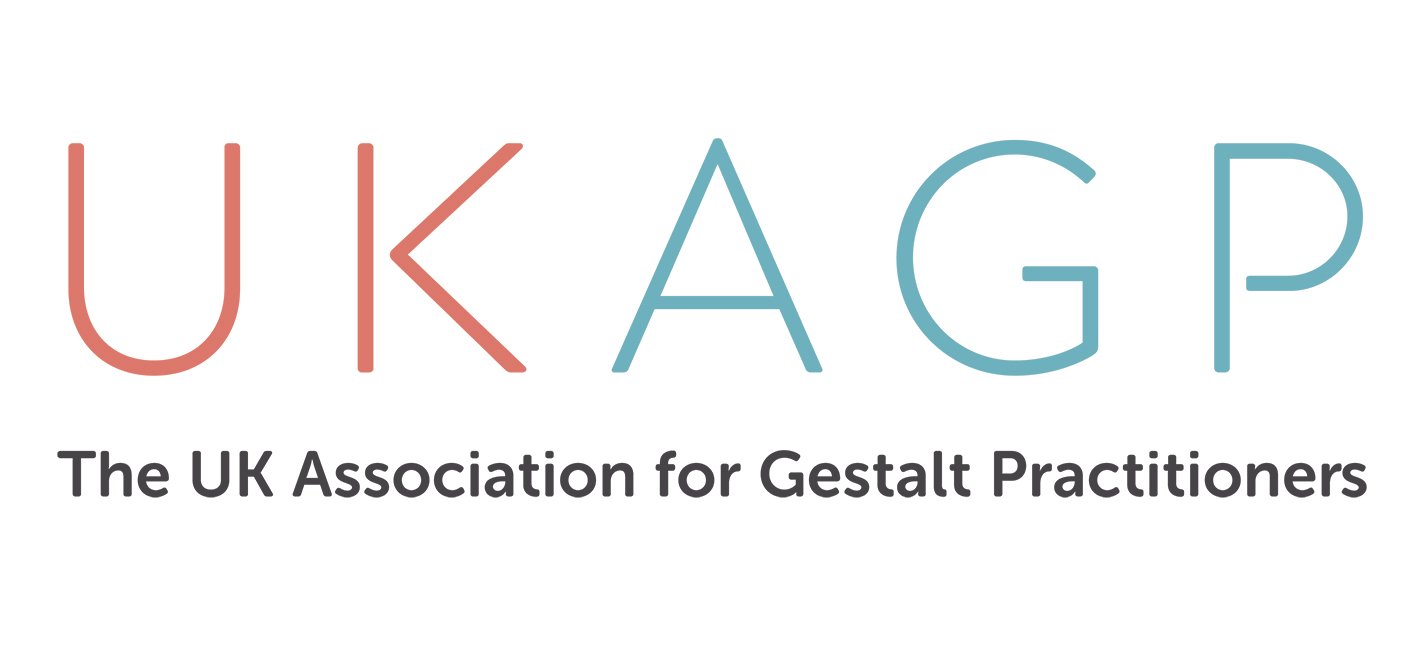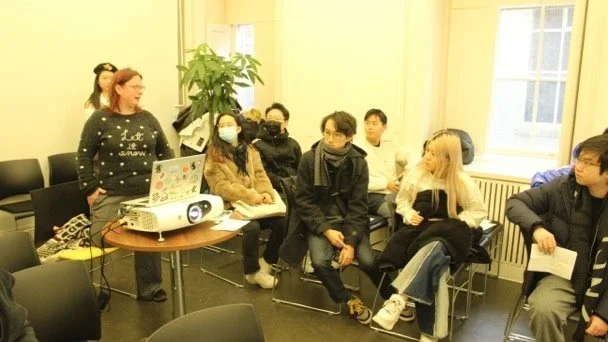Julia Ouzia: In Stuckness and Play, reflections on Gestalt and pedagogy
Photo courtesy of Estrella Sendra
It is December 2022, and I am wandering around Somerset House not sure what I’m looking for. I have lived in London long enough to know to be early for everything so I am not worried about time, but I am slightly frustrated that, where I normally would appreciate the beauty of the building I get to be in, I am mostly occupied with trying to figure out where I am and where I am going. I finally find someone who can point me to the right direction and walk up the stairs.
Do you know the feeling when you do not know what you’re looking for and then you finally find it?
Yes, that.
The moment I walk into the space occupied by the Department of Culture, Media & Creative Industries of King’s College London for their inaugural Winter Festival I am in another world. I am a guest, an outsider, so I cannot tell staff from students – all I see is a diverse group of people running around talking excitedly and/or handling some kind of probs. After 19 months of lockdowns, online teaching, and physical distancing, this is a sight for sore educator eyes (or any eyes for that matter!). I stop at what looks like a makeshift reception desk and say I am here as a guest speaker for the ‘A Conversation About Mental Health’ event. I’m told that I am early, that the organisers are not here yet, and am invited to enjoy other events and exhibitions whilst I wait.
I make note of three things as I wander around:
I do not engage with art enough!
These final year students really know what they are doing!
How lucky am I that this is part of my job?!
When it is finally time for my talk, I am a little nervous – it is entitled ‘Gestalt philosophy: What’s in it for higher education (students)?’ and I have long pondered the overlap of education and Gestalt, but will it make sense to anyone but me? Am I even the right person to talk about this, barely in my second year of training? As always with teaching, all overthinking goes out the window once I get started. I guide the audience through a meditation focused on the here-and-now and embodiment, I talk about my experience of being in my head vs. more aware of the here-and-now, I introduce the pillars of Gestalt and talk about how I imagine a more horizontal approach to higher education could get us back to the roots of why we’re actually there (more on that later!), and finally I talk about contact, and paying attention to how we moderate it.
Little did I realise at the time that the very festival I was attending was an embodiment of everything I was talking about.
The talk went well-enough, as it usually does – some bits work out differently than intended but the overall message seems to have transpired – Gestalt philosophy can help inform a higher education community that is modern, sustainable, and well. Perfect is the enemy of the good – I’m reminded that it doesn’t take much to make this point. As the students move towards other bits of the event, engaging in creative conversations about mental health, a woman stops by to talk to me. I learn that her name is Estrella Sendra and that she leads the module that the festival is associated with. She says she has a friend who is a Gestalt practitioner and reflects on how much what I was talking about resonates with her pedagogical philosophy. We agree to stay in touch, and to see if we can collaborate on a publication around this.
The opportunity comes sooner than expected – in January 2023 Professor Narelle Lemon of Edith Cowan University in Perth, Australia announces that she is editing a new book to be published by Routledge in 2024 focusing on wellbeing and self-care in higher education. I email Estrella right away: let’s do this. We need to pick a word from a list to be associated with our chapter – I am considering the chapter to be a reflection on boundaries, the making and breaking of them, and Estrella feeds back that the way we met, the spirit of the festival, was really about a word further down the list: hope. We agree on the word and to incorporate bell hooks’ ‘pedagogy of hope’ in our theoretical working of the chapter – the festival is to serve as a case study for what we are assimilating.
Over the next few months, Estrella and I meet, brainstorm, write, edit each other’s writing, grapple with a strict word count and different ways of referencing, and generally enjoy each other's energy. The more the work comes together and takes shape, the more we see each other and the way we work in our respective contexts but also together in it. We tackle each pillar of Gestalt (plus experimentation!) one by one:
Dialogic relating: Estrella approaches teaching on her module in a way that encourages horizontalism and student empowerment – the students own the festival and, thus, the module. Dialogic relating is core to both of our teaching philosophies.
Phenomenology: We argue that the phenomenological method is probably most useful when thinking about assessment where, as educators, we seek to honour our students’ understanding of the material, especially in authentic assessments as are incorporated in both Estrella’s and my teaching.
Field theory: We reflect on how much what was happening in the wider field was impacting the festival and is impacting higher education in general. The global pandemic has put a magnifying glass on issues of racism and ableism, amongst others, in education and a field-theoretical lens appears non-negotiable in our work at this point.
Experimentation: The festival, and indeed most of our teaching, is experimental in nature. It uses the ‘safer space’ of education to invite students to try different ways of being that can inform their future professional approaches. In our view, this is one of the main transferrable skills students are owed by the higher education system.
We end our chapter by asking a big question: What is higher education? It feels like in the last decade in which we have moved to a more-and-more neoliberal higher education system, the meaning of a university has gotten lost in political translation, a process that was also magnified by the pandemic which threw up fundamental questions around whether online learning is ‘worth the money’ that students pay for it. We propose the following: higher education is a place of meeting in service of society, to generate new knowledge, educate future professionals, and challenge established views of thinking. At the end of the day, this is what we owe society, including our students, and what we are able to deliver.
Taken together, we conceptualise Gestalt-informed hopeful pedagogy according to the following interlinking principles:
Meeting and caring in a plural community that operates at the intersection of our similarities and difference.
Learning through embodied lived experiences in a way that allows us to feel the impact of what we are learning.
Being experimental and creative in a way that promotes the creative and experimental expression of individuals.
Active listening and acknowledged interdependence in order to foster a safe and inclusive environment where students are aware of their individual agency.
Horizontal collaboration, challenging hierarchical thinking to allow students to make sense of their own learning.
Engaging with the wider society – only in doing so can we of service to it, and to each other.
And finally, at the centre of it all, hope.
How does all of this resonate with this year’s theme of ‘In Stuckness and Play’? I am hopeful that we are becoming unstuck in education, the fact that books like the one edited by Narelle exist, bringing together 34 authors who are all passionate about finding ways to create a sustainable higher education that prioritises wellbeing and self-care, encourages me in my feelings of hope. One thing I loved most about being involved in this project was the inherent respect in all elements of it – reviews were invited to be supportive rather than critical and most emails came with a gentle reminder to work on one’s own terms, especially as emails reached inboxes at all hours of the day as those involved were from all over the globe. As its title suggests, things were done differently in the process of publishing this book and it was refreshing and motivating.
The way in which we become unstuck in higher education at the moment seems to, increasingly, happen through play – creative ways of being and thinking that reshape what is behind red brick walls and make it more accessible, and therefore useful, for all. What is key here is that Gestalt knows how to do play very well – it is all there, right in the heart of our theory, but it is not always being used for all its strengths. Estrella and I hope that this chapter does a small contribution to offer what we believe Gestalt can bring to higher education to the wider community, and to allow colleagues to use it to inform their own teaching.
References
hooks, b. (2003). Teaching community: A pedagogy of hope. Routledge.
Ouzia, J., & Sendra, E. (2024). Doing Things Differently through the Lenses of Gestalt Philosophy and Practice-based Learning: A Hopeful Outlook on the Benefits of Co-creating with Students to Support Wellbeing in Higher Education. In N. Lemon (Ed.), Doing Things Differently: Raising Awareness of Wellbeing and Selfcare as a Priority in Higher Education (pp. 106-118). Routledge. https://doi.org/10.4324/9781003457510
Julia Ouzia
Julia is a Senior Lecturer in Psychology (Education) at King's College London where she teaches cognitive psychology, psycholinguistics, and an introductory talking therapies module. She is also involved in research and theoretical writing in these areas. Julia is a fourth year trainee at the Metanoia Institute and practices as a Gestalt practitioner in South West London.


